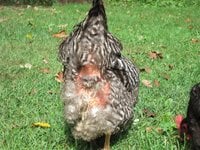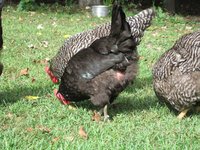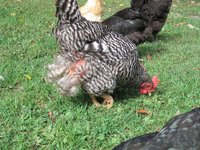I do very little of the "extra" stuff, though they get probiotics in plain yogurt mixed into something occaionally. I refuse to feed fermented feed, though. I am not on that bandwagon at all, not after what I've seen. I don't sprout stuff, nothing fancy. They do free range on occasion and they forage for natural wild foods in the fresh air and sunshine, which I think it what keeps them healthier than all the stuff I myself could do for them.
Folks have raised chickens for centuries without all the fuss. I do think it's become really too complicated for some backyard flock owners, trying this and that, new fads, etc. So much of a chicken hen's issues are plain old bad genetics, which you cannot overcome with supplements. When you get better stock, you get better overall results, I've found. I feed commercial feed, a good quality higher protein layer pellet (not organic, not non-GMO, just regular decent non-dusty, fresh feed) plus a 12-13 grain scratch mix with occasional "treats" that I put turmeric, garlic and olive oil, plus plain yogurt into. I really don't fuss about any of it. And I have 6-10 year old hens laying. But none of them are hatchery girls. I can't afford to feed them better than I eat myself nor would I if I could. And they are doing just fine. BUT, all the great care in the world will not offset sucky genetics. JMHO.
I would love to hear more about your opinion of the fermented feed. What have you seen that makes you against it? I have only ever heard good. As far as yogurt, I have often read people saying that chickens can't digest dairy? I do on occasion share some of my fresh kefir with the girls. They love it!






